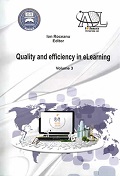DEVELOPING VIRTUAL AND COLLABORATIVE LEARNING SKILLS FOR TACKLING EARLY SCHOOL LEAVING
DEVELOPING VIRTUAL AND COLLABORATIVE LEARNING SKILLS FOR TACKLING EARLY SCHOOL LEAVING
Author(s): Andreea Cleminte, Irina Gheorghiu, Stefan COLIBABASubject(s): Education
Published by: Carol I National Defence University Publishing House
Keywords: school dropout; virtual learning; collaborative learning; teaching methodologies; communication techniques; education
Summary/Abstract: Today's reality testifies to the fact that teachers are still lacking appropriate skills and competences, and consequently motivation, to understand and deal effectively with students at risk of early school leaving. Often, teachers are not able to identify well in advance manifestations of the risk factors leading to dropping out, not to mention the shortage of initiatives for effective intervention. The focus of the paper is on how the Stay@School (Multilateral Transfer of Innovation) project tries to provide a working solution to the needs of the teachers outlined above by setting up a VLE in order to provide them with skills for identifying students at risk of early school leaving and preventing and combating the problem. The project’s training program focuses first on how to identify students at risk, and then on the strategies used to address the problem: communication techniques - offering practical ideas on how to prepare and carry out an effective conversation with young people and their parents as well as on the action to be taken; teaching methodologies – based on effective teaching strategies that foster the active involvement of all students in productive educational pathways. The strategies proposed include active teaching and learning, collaborative learning, peer education and the effective application of creativity to education; evaluation of educational processes - teachers need to be acquainted with the modern meaning of evaluation, evaluation types and forms, evaluation models, techniques and tools in order to become able to use them effectively in their school classes to achieve, among other educational objectives, better prevention of early school leaving; and finally, external resources and support for teachers and students - introduction to authentic scenarios for reflection, an exploration of a variety of teacher responses to students in danger of leaving school early, an exploration of the level of risk of particular students, a description of the range of support available to help with the problem and the examination of different types of support.
Journal: Conference proceedings of »eLearning and Software for Education« (eLSE)
- Issue Year: 9/2013
- Issue No: 03
- Page Range: 284-289
- Page Count: 6
- Language: English

